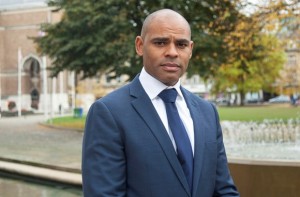Bristol’s Tier 3 restrictions when it comes out of the national lockdown next week will have a “chilling impact” on its economy, with much of its hospitality sector remaining “frozen” in the vital run-up to Christmas, business groups and the city’s mayor have warned.
Mayor Marvin Rees, pictured, said the impact on Bristol’s hospitality and night-time economy – on which around 23,000 jobs depend- was particularly worrying and asked people in the city to work together and follow the guidance in order to move into a lower tier. 
Hoteliers in Bristol described themselves as heartbroken at news, with the Bristol Hotels Association (BHA), which represents around 40 businesses in and around the city, saying the decision could have a catastrophic impact on their businesses.
While all shops are able to reopen from Wednesday if they have social distancing measures in place, pubs, bars and restaurants will remain as take-away only.
Bristol Chamber of Commerce group Business West said putting Bristol in Tier 3 – along with its neighbouring authorities South Gloucestershire and North Somerset – would effectively continue the national lockdown for the area.
Business West managing director Phil Smith, pictured, said: “The restrictions will have a chilling impact on the region’s economy and its ability to recover into the new year – and is very disappointing news for the many businesses for who the run up to Christmas is a vital time for earnings.
“We urge everyone to redouble their efforts to comply with social distancing, to allow us to get the virus under control and start to ease restrictions before Christmas and into the new year.” 
In the week ending November 21, Bristol had 1,505 reported cases of Covid-19, or 324.8 cases per 100,000 people – a drop of 161.8 on the previous week.
Mayor Marvin Rees had hoped that the fall might have put the city in the less strict Tier 2.
He added: “Covid-19 is devastating lives and livelihoods. For every moment we are in tier three, the hospitality sector will be further damaged.
“We know that one of the main reasons for the recent increase in infection rates is because people are going into other people’s homes when they shouldn’t be.
“We all want to see friends and family, but for now it is really important we protect those we love by not visiting them. The sooner we all do this, the sooner we can get back to some normality.”
With the city council estimating the cost of the current month-long lockdown on Bristol at around £54m, being in the third tier status will add to the burden.
CBI South West director Deborah Fraser, pictured, said for many businesses in the region going into toughened tiers while waiting for a vaccine would feel like suspended animation.
“Some parts of the economy, such as retail, can begin to re-open and look towards a recovery. It gives our high streets a chance to rescue some of the vital festive trading period,” she said. 
“But for other businesses the ongoing restrictions in Tiers 2 and 3 will leave their survival hanging by a thread. Hospitality will remain frozen. And supply chains that cross regions in different tiers will be hit even if they don’t face direct restrictions.
“It’s vital that these firms receive the financial support they need to make it through to the spring. Clarity about ongoing employment support, including the Job Retention Bonus, will help protect as many jobs as possible.
“Businesses need to know what support will be there through to March and beyond in advance, rather than taking it down to the wire.”
The BHA said hotels had been hoping they would be able to re-open their doors again from December 2 but the Tier 3 decision meant they must remain closed aside from some very limited exceptions.
Chair Raphael Herzog, pictured, said: “Many Bristol hotels have been operating at a loss since April, yet many of the have invested thousands of pounds in making our premises safe for staff and guests, yet we were one of the first sectors to be shut down.
“Due to all the investment and safe practices we have introduced, it is safer to visit a hotel than go to a large grocery store.
“We had been hoping we would be able to open again in December and start on the road to recovery.
“Now, we’re not likely to be able to begin that process until 2021, so we would urge the government to help kick-start this 2021 recovery by giving us some extra support.”
He called on the government to help kick-start the 2021 recovery by maintaining the reduced VAT rate, which was introduced in July, to the whole of 2021, and to also introduce a business rates holiday for 2021/22.
“Our businesses have already been closed for so much of the year,” he added.
“September to December are historically very strong months for hotels, and revenue generated in this period offsets the lower levels of business we traditionally experience in January and February.
“However, because of the pandemic and the lockdown, this has not been able to happen this year, which is why we desperately need more support.
“We want to see furlough for all staff, even those working in closed hotels. Businesses have to pay 100% for those staffing – operating the phone lines and so on – and providing security for hotels yet the businesses have not been able to trade and therefore have no revenue.”
The BHA said occupancy levels last month in member hotels was around 45% – compared to 85% in October 2019. In September 2020, the rate was 60% compared to 87% in 2019. In July 2020, the rate was just 31%, compared to 88% in 2019.






























